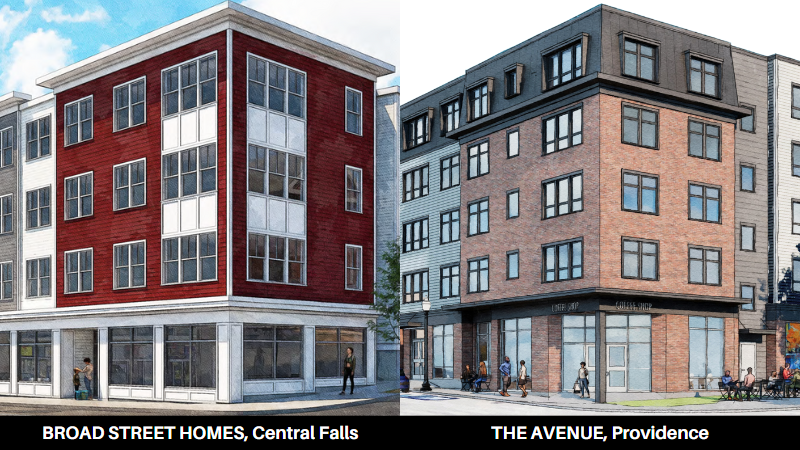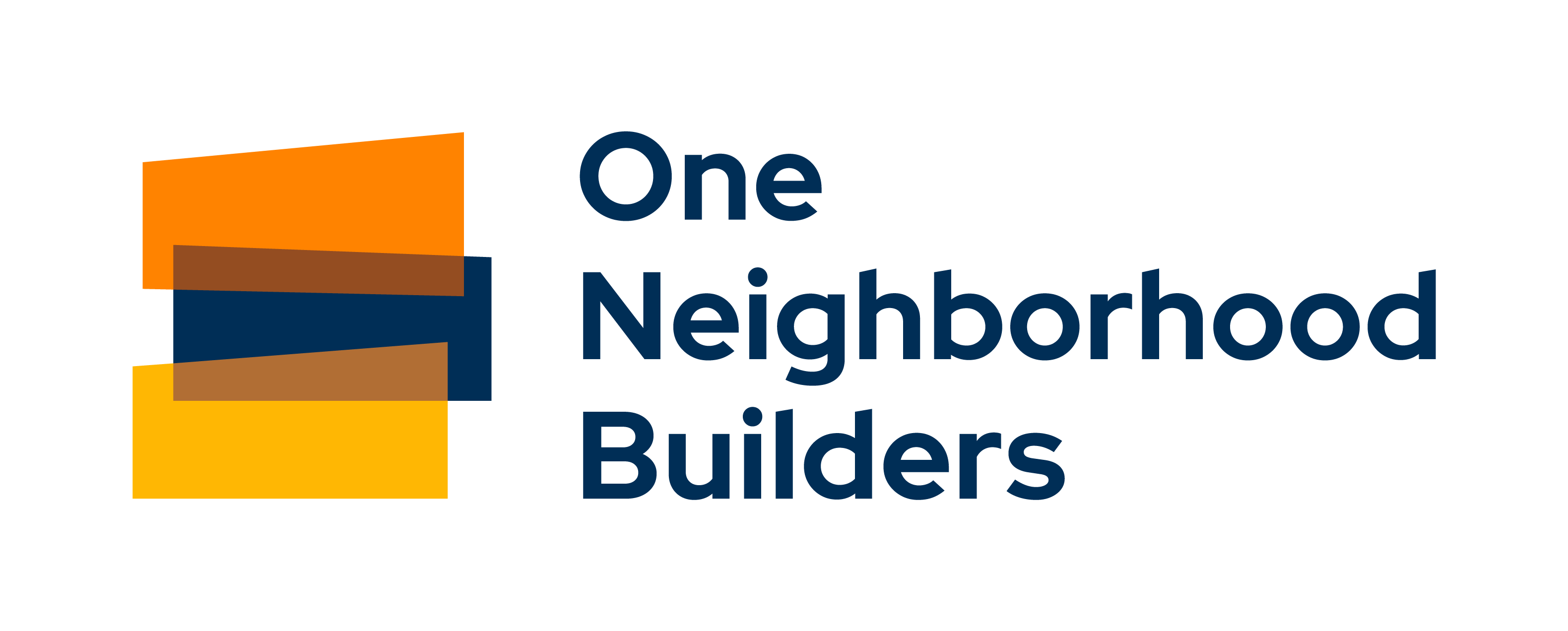
Architectural renderings of Broad Street Homes in Central Falls and The Avenue in Providence.
PROVIDENCE, RI – Governor Dan McKee and RIHousing today announced the award of more than $101 million in funding to support the construction and preservation as well as operating costs of over 1,400 units of housing across Rhode Island. Of the 1,481 units, over 1,200 will be affordable housing. The announcement was made earlier this morning at RIHousing’s May Board Meeting. In total, it’s estimated that these developments will support over 3,000 jobs across the state.
“For Rhode Island to be an attractive place to live, work, and raise a family, we must address the availability and quality of housing – that means everything from providing supports to those experiencing homelessness, to increasing affordable housing, to ensuring we build more workforce housing for our middle-class families,” said Governor Dan McKee. “Thank you to Commissioners for approving these projects which will create more than 1,400 units of housing across 13 of our municipalities.”
The $101 million in funding comes from various federal and state resources including $82.9 million from Governor McKee’s $250 million FY23 budget investment in affordable housing and homelessness support programs.
Other funding sources include: Capital Magnet Fund, Housing Production Fund, Acquisition Revitalization Program, HOME Investment Partnerships Program, Housing Trust Fund and for operating support Housing Production Fund-Extremely Low-Income Operating Reserve Program.
“As a key architect of the State Fiscal Recovery Funds program, I worked to make this federal funding available to help states address areas of greatest need. Clearly, there is high demand for more quality, affordable housing opportunities in Rhode Island and other states, and production needs to keep up. This federal investment will help more hardworking families attain housing and put down roots in a place where they can afford to raise their kids. It will help build the foundation for stronger, healthier communities and a more productive workforce,” said Senator Reed, who, along with his colleagues in the delegation, delivered the $81 million in SFRF funds, as well as other funding for the project through the federal Housing Trust Fund, HOME Investment Partnerships Program, and Capital Magnet Fund dollars.
“Skyrocketing housing costs and low supply are squeezing Rhode Island families. I applaud Governor McKee and the General Assembly for their focus on addressing the housing crunch and supporting RI Housing’s work,” said U.S. Senator Sheldon Whitehouse. “Creating more affordable housing is a good way to leverage the federal funding that the delegation helped secure.”
“This investment in housing, especially the support for more than 1,200 units of affordable housing, is a key step in ensuring that every Rhode Islander has a safe, clean, and affordable place to live and raise a family,” said Congressman David N. Cicilline. “In Congress, I’ve been proud to advocate for and help bring home federal dollars to preserve and construct housing across Rhode Island. The projects announced today will not only help address our housing crisis but also support more than 3,000 jobs. These are types of smart investments that will strengthen all of our communities.”
“Every Rhode Islander deserves a safe, affordable place to call home,” said Rep. Seth Magaziner. “Thanks to this federal funding, Rhode Island will be able to reduce homelessness and lower housing costs in the Ocean State.”
“Just under a year ago, we passed our $250 million investment to meet Rhode Island’s pressing need for new affordable housing. Today’s vote is a pivotal moment in turning that funding into hundreds of units across a dozen developments statewide,” said Lieutenant Governor Sabina Matos. “We’re grateful to our partners across the state who are moving quickly to ensure Rhode Islanders have access to safe and affordable housing.”
To streamline the process, the State has adopted a universal funding application that consolidates the request for multiple financing sources. This allowed interested developers to apply for multiple funding sources through a single consolidated Request for Proposals (RFP). The first round of the consolidated funding application closed in April 2022 and was awarded in June 2022. The second round of consolidated funding closed in January of 2023 and was awarded today.
“These 23 investments represent a significant step forward. Over the coming years, these developments will break ground, advance through construction, and materialize into more than 1,400 new or preserved housing units for Rhode Islanders,” said Rhode Island Secretary of Housing Stefan Pryor, who serves as Chair of the RI Housing Board of Commissioners. “We’re grateful to the RI Housing team and to these developers for moving these needed projects forward. It’s crucial that we keep the momentum going, which is why Governor McKee and we have proposed a new state-level low income housing tax credit and an additional $29 million in federal funding for the purpose of producing additional housing and addressing homelessness.”
Proposed by Governor McKee and approved by the General Assembly last year, the $250 million for affordable housing and homeless programs is being funded through the State’s federal allocation of State Fiscal Recovery Funds (SFRF) under the American Rescue Plan Act (ARPA) of 2021. RIHousing is administering over $200 million of this historic investment including $155 million reserved for housing production and preservation; $30 million for down payment assistance; $20 million for community revitalization. As of today, nearly $115 million of these resources have been committed through RIHousing.
“In times when our state faces increasing housing challenges, being nimble, innovative, and a good partner is critical to achieving our shared goals,” said Carol Ventura, Executive Director of RIHousing. “The State Fiscal Recovery Funds we have administered have been essential in the construction and preservation of homes for hundreds of families across the state and we’re proud to help meet the state’s housing demands, support jobs and reinvigorate the economy.”
The 23 developments receiving awards are:
Central Street Development (Pawtucket/Central Falls): 30 new units and the preservation of 32 existing units, with the addition of two community service spaces: a homeownership center and “Tech Hub” for residents. The development is a mixed-use, mixed-income project across twelve sites in Pawtucket and Central Falls.
Rosebrook Commons (Middletown): a mixed-use, mixed-income development including the construction of 64 new units and 23,000 sq. ft. of ground floor commercial space. Thirteen units will be affordable to households at or below 30% of AMI, 38 will be affordable to those at or below 60% of AMI, and the remaining 13 units will be slated as middle income with rents up to 120% of AMI.
Southpoint Commons (Westerly): a mixed-income development containing 72 new units, office space, a clubhouse and other amenities. Sixteen of the units will be reserved for households at or below 30% of AMI, 41 of the units will be reserved for households at or below 60% AMI, and the remaining 15 will be market rate units.
Reynolds Farm Senior Housing II (North Kingstown): 40 new units restricted to residents that are aged 55 and older with incomes below 60% AMI. The larger project is a three-phase development located on 78 acres that will contain multiple community spaces for residents, including space designed specifically for providing social services to residents.
Broad Street Homes (Central Falls): a proposed development site made up of three proximate lots along Broad Stret in Central Falls adjacent to City Hall. The project will develop 47 new units, which will range in size, from efficiencies to three bedrooms. Six of the units will be reserved for households at or below 30% of AMI.
Ade Bethune House (Portsmouth): a new construction project that will create 54 units of affordable, age-restricted housing and a new senior center. Six one-bedroom units will be reserved for households at or below 30% of AMI. The remaining 34 one-bedroom units and 14 two-bedroom units will be for households at or below 60% of AMI.
Potters Tigrai Apartments (South Providence): for a total of 57 units, the development will preserve 37 existing units, while creating an additional 20 units. The development is comprised of two separate components, both located in South Providence. The development is named in honor of Asata Tigrai, a housing advocate who has worked in the neighborhood for decades.
The Avenue (Providence): a development that will consist of two components. The first component contains 46 units located on sites in the Elmwood neighborhood of Providence that will be rehabilitated to ensure they remain safe, affordable housing units. The second component involves the construction of 39 new units, in addition to commercial space and project amenities.
Summer Street Apartments (Providence): 176 new units on Broad Street in Providence. All units will be one-bedroom units available to households with incomes at or below 30% of AMI. The developer, Crossroads RI, intends to replace the existing Travelers Aid Housing “tower” units with the Summer Street Apartments and the development will be available to those experiencing homelessness or at risk of experiencing homelessness. Units will be supported by various programs including a Project Based Rental Assistance contract, 811 vouchers and the Continuum of Care program.
Lockwood Plaza Phase I (Providence): originally built in 1979, the development consists of 209 affordable units, 108 of which are townhouses, while the other 101 units are in a high-rise building. Phase I is for the townhouse units, as the high-rise component will be completed in a subsequent phase. The rehabilitation work will include upgrades to the kitchens and baths in all units, upgrades to the heating/ventilation systems, plumbing and hot water systems and ADA improvements.
Copley Chambers II & III (Providence): 124 new units of affordable housing and 6,800 sq. ft. of ground floor commercial space. The development will contain two five-story buildings on adjacent lots. Twenty percent of the units will be for households below 50% of AMI and the remaining units will be restricted to individuals or households earning incomes at or below 80% of AMI.
Pocasset Reserve Phase I (Tiverton): formerly known as Tiverton Heights, the development will construct 275 new units. Phase I of the development will create 129 units, of which 32 will be reserved for households earning at or below 80% of AMI.
Ralph R. Russo Manor (Johnston): a development that will preserve 22 existing units that was originally constructed in 1990. Since its original construction, the development has received little investments and requires substantial rehabilitation. The developer has proposed a complete renovation of all units, including new kitchens and bathrooms, new flooring, HVAC and elevator systems. Upgrades to roofs, windows and doors will also be included.
Villages at Manville (Lincoln): 72 new units that will be built on a vacant 5-acre site. The improvements will consist of 3 three-story residential buildings and a single-story community building. All the residential structures will be garden-style walk-up buildings. The units will be a mix of one-bedroom/one-bath and two-bedroom/one-bath units and available to households with incomes 30% – 80% AMI.
Millrace District (Woonsocket): an adaptive reuse of three vacant mill buildings that are proposed to be revitalized into a mixed-use, mixed-income development comprised of 70 ‘live/work’ studio, one-bedroom and two-bedroom apartments. The development will also include 16,500 sq. ft. of office, retail and arts fabrication space.
Studley Building (Providence): a 65-unit building in Downcity consisting of 5 one-bedroom, 20 studio and 40 efficiency/micro-loft units. Fourteen units are currently Workforce Housing Units. The developer is also seeking to convert an additional 34 (non-micro-loft) units into Middle Income Program units, which will serve residents with incomes below 100% of AMI.
East Point (East Providence): a development that will construct a total of 100 new units in two phases of 50 apartments each. Phase I, the subject of today’s award) will include the construction of 25 duplexes with 50 two-bedroom/two-bath units of which 12 units will be affordable households up to 100% of AMI.
Walker Lofts (Lincoln): a substantial rehabilitation of a historical blighted mill complex. The development will consist of 126 total units. Thirty-two units will be restricted to households with incomes at or below 80% of AMI, while the remaining units will be unrestricted. The property is located approximately five minutes from the newly constructed Pawtucket/Central Falls Commuter Station and consists of one-bedroom, two-bedroom and three-bedroom units.
Georgiaville Place (Smithfield): a newly constructed homeownership development consisting of 9 tri-level townhomes. All 9 units will be ready for occupancy within 90 days. Five of the units will be designated for households with incomes up to 120% of AMI and the remaining four units will be market rate units.
Bernon Mills (Woonsocket): a historic mill to be redeveloped into 60 units of rental housing and commercial space. All units will be restricted to households with incomes at or below 80% of AMI. There will be a mix of efficiency, one-bedroom and two-bedroom units.
24 Inkerman Street (Providence): proposed rehabilitation of a three-story home with three two-bedroom units. The site is close to Downtown and is located on a bus route.
Hive Apartments (Providence): the redevelopment of two historic buildings into one mixed-use property that includes 124 rental units. The development’s units will be market rate apartments, along with 5-6 retail units below grade level, on the ground floor and the rooftop. Set in Downtown, the rehabilitation will revitalize a large, centrally located block in the neighborhood.
25 Bough Street (Providence): currently an abandoned, blighted building in the Olneyville neighborhood, the development will create a mixed-use commercial community center to serve the neighborhood. The mission of the development includes education, workforce and economic development, as well as reducing health inequalities.


